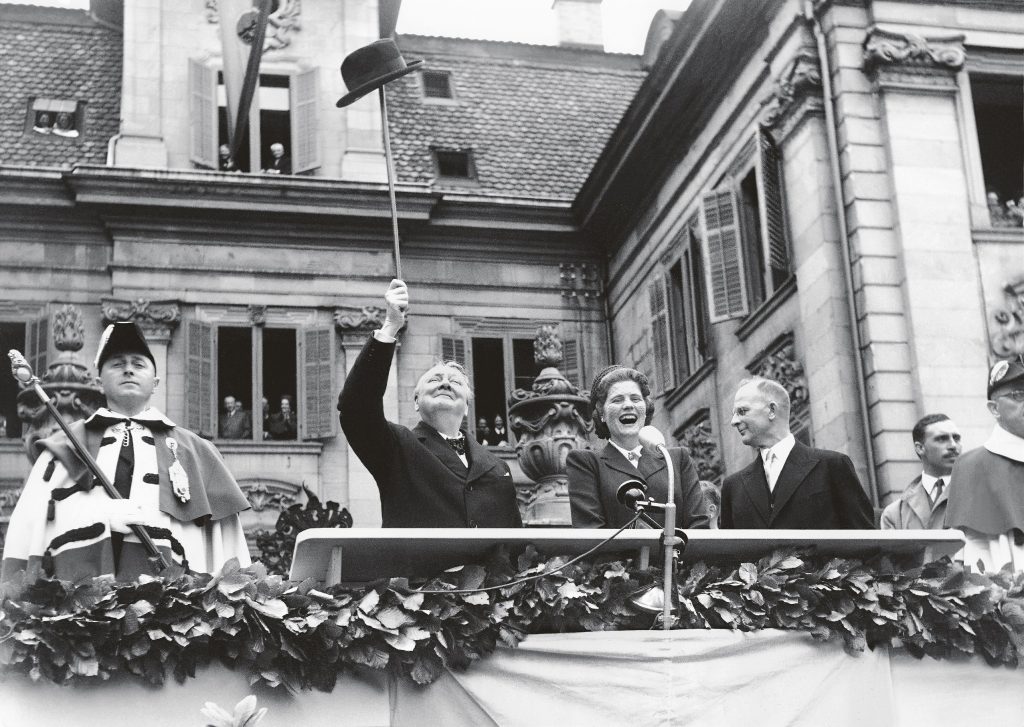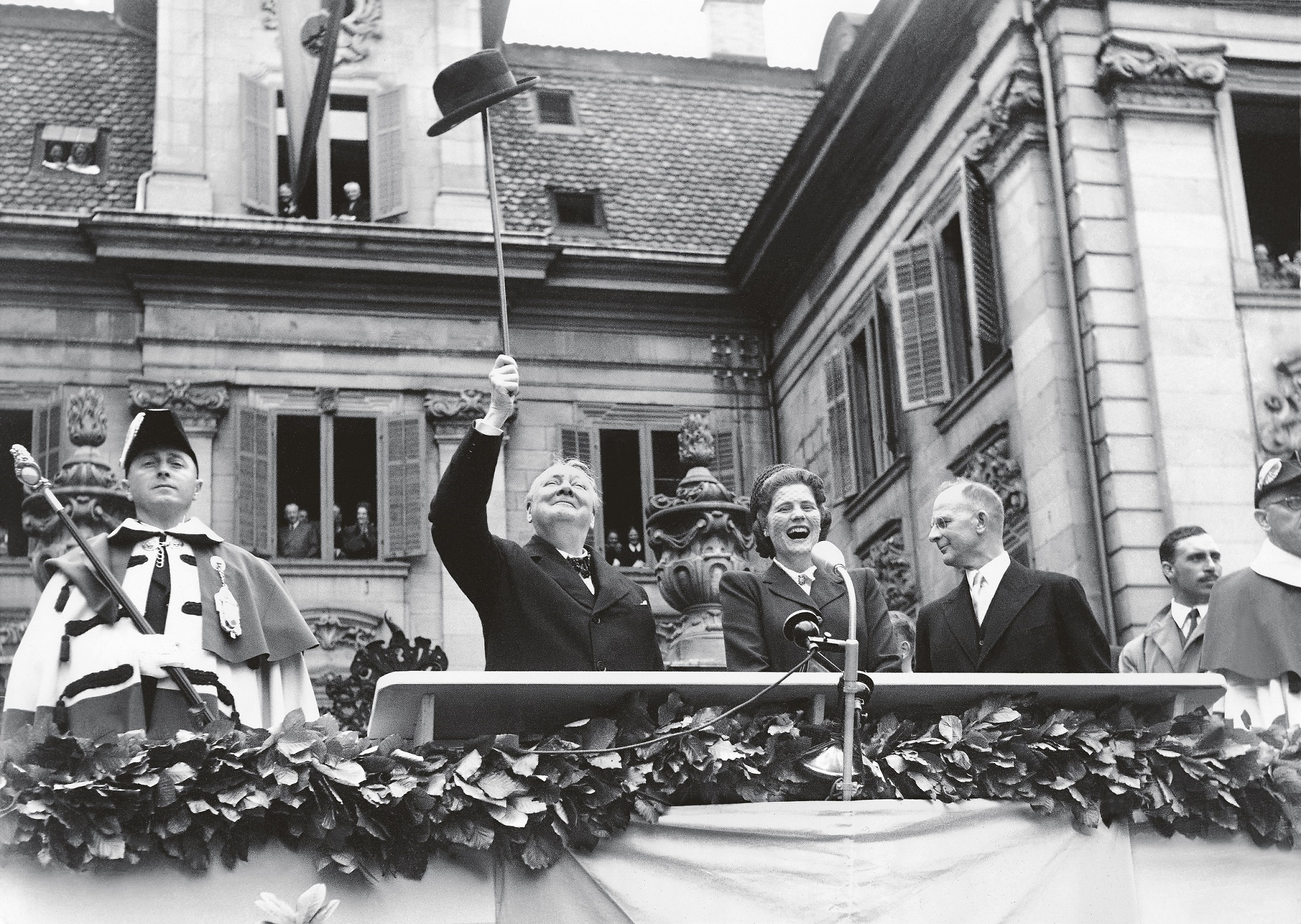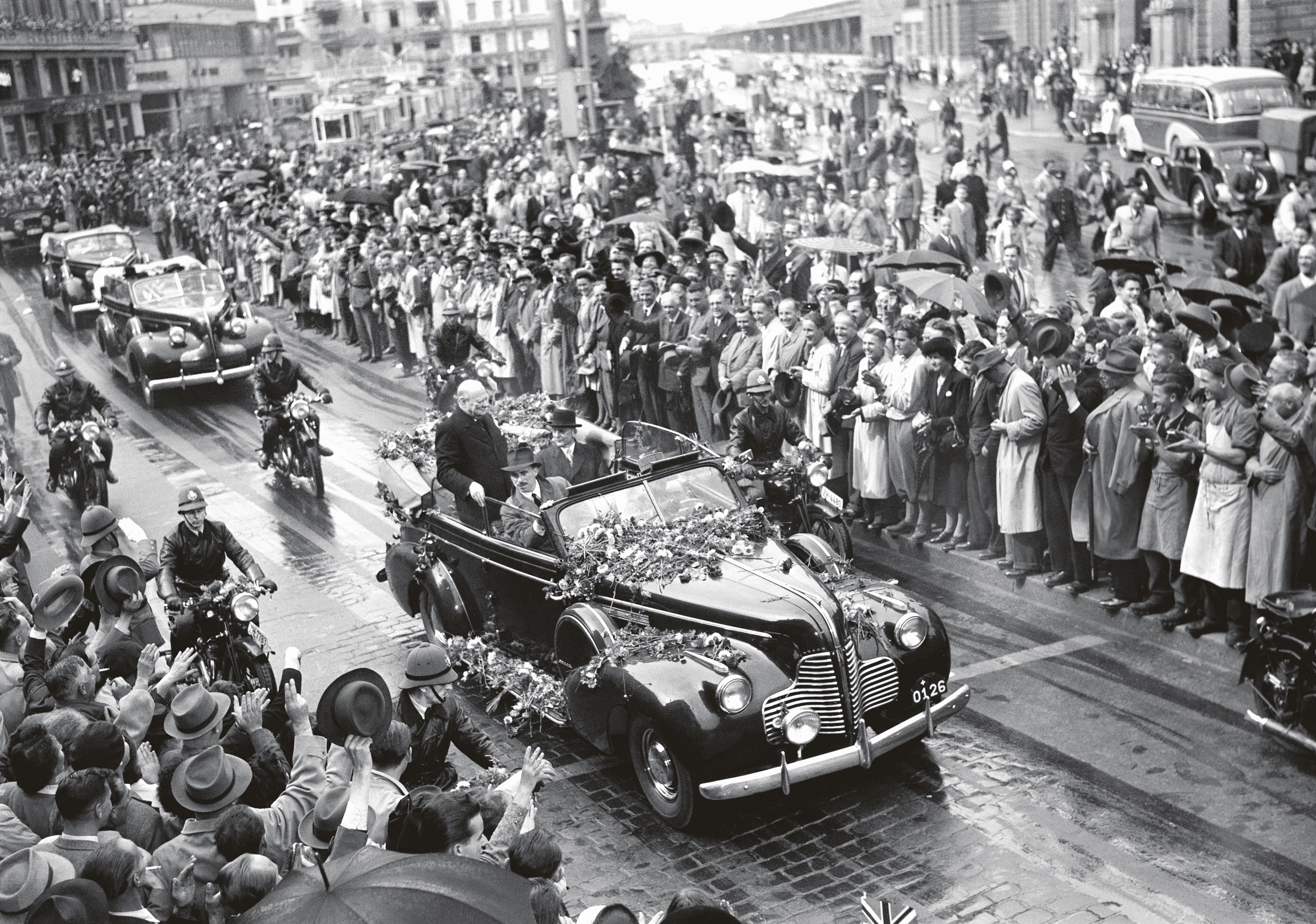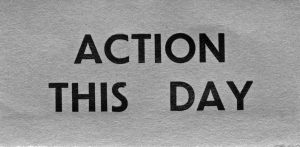Finest Hour 173
Churchill’s Europe

August 14, 2016
Finest Hour 173, Summer 2016
Page 06
By Felix Klos
Felix Klos is the author of Churchill on Europe (IB Tauris, 2016). The full hardback version of the book will be released globally in early 2017.

When David Cameron succumbed to domestic party political pressure in 2013 and announced his referendum on British membership in the European Union, he knew he was playing with fire. For Margaret Thatcher, citing Clement Attlee, the referendum was “a device of dictators and demagogues”1; for Cameron’s Conservative Cabinet it proved a highly flammable political football.
It was hardly surprising that during the referendum campaign the nation more than once turned its eyes to its greatest son: Winston Churchill. Beating out the likes of William Shakespeare, Charles Darwin, and Isaac Newton in the BBC’s “Greatest Briton” poll, Winston Churchill has almost come to symbolize what it means to be British.
A Long Tradition
This March, Boris Johnson, then still the public face of Vote Leave, published his campaign manifesto to leave the European Union in The Daily Telegraph. In his conclusion, Johnson invoked the spirit of Churchill as the ultimate historical justification of the Brexit position. Two months later, Prime Minister David Cameron staked his own claim on Churchill, suggesting that he would have wanted Britain to remain in the EU.
Johnson and Cameron stand in a long tradition of conjuring up Churchill’s ghost in British public discourse on Europe. In 1975, Margaret Thatcher appeared under Churchill’s statue in Parliament Square to campaign for “Remain” in the first “European” referendum. In 1996, in the midst of the single currency debate, Edward Heath, who took Britain into the European Economic Community, countered an avalanche of newspaper articles claiming Churchill for the skeptics, by arguing that Churchill would have wanted “Britain’s full participation in the European Union.”2
More recently, UK Independence Party politicians spread a fabricated “quotation” implying Churchill would have joined them in voting out. Even Andrew Roberts, the eminent historian and ardent Brexiteer, was tempted to suggest ahead of the referendum that Churchill would never have supported “a bloated Brussels bureaucracy making 60% of British laws.”3
So who can claim Churchill’s blessing beyond the grave? The simple answer is no one. It is clearly impossible to give Churchill a vote on the workings of the modern-day EU. We will never know what he would have voted or what he would have made of the current crisis in the West. But it is important and necessary to study Churchill’s European legacy as a way of understanding the origins of the post-war European project and Britain’s role in it.
Churchill’s Legacy
After the Second World War, Churchill became the greatest pioneer of the European ideal. “If I were 10 years younger,” he told his wife, “I might be the first President of the United States of Europe.”4 In September 1946, warning his audience at the University of Zurich that he would “astonish” them, Churchill called upon France and Germany to enter into a partnership as the first step in building “a kind of United States of Europe.” Having learned the bitter lesson of a vicious cycle of nationalistic aggression that all but wiped out European civilisation in the twentieth century, Churchill underpinned his call for European unity with a warning against revanchism: “We must all turn our backs upon the horrors of the past. We must look to the future…. There can be no revival of Europe without a spiritually great France and a spiritually great Germany.”5 The speech, as Churchill foresaw, became a turning point in European history.
The Zurich speech was followed by a flurry of activity fuelled by the willpower that was the hallmark of Churchill’s larger-than-life personality. In 1947, at the inauguration of his United Europe Movement, Churchill first stated his support for a United Europe “in which our country will play a decisive part.”6 In the light of Cold War Soviet expansionism, Churchill was able to state publicly what he had come to believe even before the Zurich speech. At Zurich, Churchill had famously and ambiguously suggested that Great Britain, the United States and even Soviet Russia might all be “sponsors” of a united Europe.7 That one word has bedevilled Churchill scholars and European historians alike for decades.
Hoodwinking the Russians
The evidence, however, suggests that it was no more than a clever device to hoodwink the Russians. In order not to upset American and Soviet opinion so soon after the war, Churchill needed to make the Russians believe that they would not be challenged by a British-led European bloc. As he put it unambiguously to two high-ranking Swiss diplomats on the night before his speech: “I have preferred not to stress the point of British membership of the United States of Europe so as to leave to the other nations the task of inviting us. One must not give the impression that we wish to control Europe, even though it is clear that only Britain is capable today of guiding her properly. Or perhaps first you invite Russia, which will refuse, and in that case Britain will be able to join.”8
At the famous 1948 Congress of Europe in The Hague, Churchill inspired a generation of European leaders with his message of reconciliation. The Congress, chaired and organised by Churchill, pressed the governments of Western Europe to create the Strasbourg Council of Europe, Europe’s first political institution. In Strasbourg, Churchill championed the European Convention on Human Rights and secured West Germany’s re-entry into the European family. He even launched the controversial idea of a European army in which Britain would take part.
Churchill published his original written programme for what he interchangeably called “the European Union” or “United Europe” in the The Daily Telegraph on 30 and 31 December 1946. Its title: “United Europe: One way to stop a new war.” In the two-part article, among other things, Churchill presented his expansive view of Britain’s global role as a partner in three great overlapping “circles”: the English-speaking world (the “special relationship” with America), the British Empire and Commonwealth, and the European Union.
Local Difficulties
There were, of course, severe difficulties holding Britain back from the realisation of this worldview. A debilitated domestic economy, surging independence movements in the colonies and increasing financial and political dependence on the United States were the primary pains of post-war Britain. The country had neither the political clout nor the financial resources to play the role it felt entitled to after the heroics of the war. An acute awareness of these problems only strengthened Churchill in envisaging for his country a position of power at the heart of his three circles.

The important thing was the issue of compatibility. While he probably never intellectually reconciled the full implications for Britain of ever-closer union in Europe, Churchill certainly envisaged his country as a full partner in the post-war European “project.” He thought a marriage with Europe could complement Britain’s Commonwealth responsibilities and advocated a system that embraced both the European states and the dominions and territories associated with them. “For Britain to enter a European Union from which the Empire and Commonwealth would be excluded,” he told a European Movement rally in 1949, “would not only be impossible but would, in the eyes of Europe, enormously reduce the value of our participation.”9 The United States, much as it does today, thought of Britain as a European country and hoped the nation would lead the way in the gradual unification of the continent to which it belonged. Hence General Marshall’s explicit reference to Churchill’s European campaign as the source of inspiration for Marshall Aid.
Roadmap for Europe
In his 1946 Telegraph article, Churchill drew a roadmap for European integration that started with the creation of the Council of Europe. First, he argued, the Council of Europe would have to work steadily towards “the abolition or at least the diminution of tariff and customs barriers.” Second, it would “strive for economic harmony as a stepping-stone to economic unity.” Third, it would have to “reach some common form of defence.”10 And fourth, inseparably woven with all of the above, it would have to establish a common currency. European postage stamps, passports, and trading facilities would all flow out naturally from the “main channel” of the Council.
Notwithstanding his references to economic unity, what strikes the twenty-first-century reader is that Churchill’s case for Europe was essentially political. Churchill’s entire post-war campaign was based on the assumption that nation-states would relinquish some of their national sovereignty for the sake of unity. His case that small nation protectionism inevitably leads to political antagonism was determined by the central lesson of a life defined by two devastating European wars. On 27 June 1950, in one of his most moving contributions to parliamentary debate, Churchill invoked the sacrifice of past wars to justify the pooling of sovereignty in the present: “The soldier who laid down his life, the mother who wept for her son, and the wife who lost her husband, got inspiration or comfort, and felt a sense of being linked with the universal and eternal by the fact that we fought for what was precious not only for ourselves but for mankind. The Conservative and Liberal parties declare that national sovereignty is not inviolable, and that it may be resolutely diminished for the sake of all the men in all the lands finding their way home together.”11
To be sure, Churchill did write in a 1930 article for the American Saturday Evening Post, when the British Empire was still flourishing and before there was an immediate and obvious demand for Union which the war helped to create, that Britain would stand aloof from a federal Europe: “interested and associated, but not absorbed.”12 He never believed, as evidenced by his lack of initiative when returned to No. 10 in 1951, that Britain could become an ordinary member of a federal union.
Le plan français
Unfortunately for Churchill and his younger Europeanist protégés, most prominently among them his son-in-law Duncan Sandys and Harold Macmillan, ordinary membership of a federal union was exactly what was on the table when the French grew frustrated with the slow working methods of the Council of Europe, rode the wave of Churchill’s campaign, and seized the initiative by proposing the creation of the European Coal and Steel Community and the European Defence Community. The plans perverted Churchill’s call for an “organic union” of European states in which Britain could take part. And while he was furious that the sitting Labour Government refused to consider even negotiating about the terms of British participation in the European Coal and Steel Community, Churchill himself never succeeded in winning the continentals back for his case of gradualism.
All of that does nothing to change the fact that in Churchill’s post-war vision for a European Union, partly formed and moulded in the context of the emerging Cold War, Britain played an integral part. “I do not agree that the solution to our problem is to create a Europe excluding Britain,” he wrote in December 1949. “British participation is essential to the success of a European Union. It is impossible to say at the moment what form this union will ultimately take, but I am sure that the next immediate step is to develop and strengthen by every means in our power the new Council of Europe.”13 For Churchill the only way to achieve political and economic union was to let the Council of Europe grow organically into something much more than the platform of European opinion it was in 1949. Step by step. Little by little.
During his second premiership, Churchill did little to fight his party and foreign minister Anthony Eden on a newly-defined Tory European policy that kept Britain out of the European institutions emerging alongside the Council of Europe. And it took Churchill just a few weeks after his return to No. 10 to reiterate in a cabinet memorandum that he had never supported British membership in an exclusive federal union. For Churchill’s Britain, so soon after the war, the world was much bigger than Europe alone.
Last Thoughts
By 1957, however, Churchill started to regret his lack of enthusiasm for the continental plans. In 1962, when Prime Minister Harold Macmillan’s Britain felt ready to join the European Economic Community, as the EU was then called, Churchill was hospitalized and unable to comment. Field Marshal Montgomery, however, after visiting the patient, boldly stated to the press that Churchill opposed the application, a deliberate misrepresentation of an old and sick man’s views. In response, Churchill’s secretary, Anthony Montague Browne, without consulting anyone, “released to the press a statement of WSC’s views on the subject that he had embodied in a private and unpublished letter to his Constituency Chairman, Mrs Moss, in August 1961.” While rightly sceptical of the chances of success and careful to stress that no damage should be done to Commonwealth interests, the statement read: “I think that the Government are right to apply to join the European Economic Community, not because I am yet convinced that we shall be able to join, but because there appears to be no other way by which we can find out exactly whether the conditions of membership are acceptable.”14
Whether modern Britons like it or not, the unity in Europe is to a great extent the evolved and still organically developing legacy of Winston Churchill.
Endnotes
1. “Herding Cats: How Referendums Can Go Wrong,” The Economist, 17 October 2015, accessed 8 July 2016, http://www.economist.com/news/special-report/21673504-referendum-results-are-notoriously-unpredictable-herding-cats
2. Edward Heath, “A Euro-sceptic? Churchill? Never,” The Independent, 26 September 1996.
3. Andrew Roberts, review of Churchill on Europe by Felix Klos, The Churchill Project, Hillsdale College, 21 June 2016, accessed 8 July 2016, https://winstonchurchill.hillsdale.edu/churchill-europe-felix-klos/
4. Nigel Ashford, “The Conservative Party and European Integration 1945–75” (PhD diss., University of Warwick, 1983), p. 43.
5. Robert Rhodes James, ed. Winston S. Churchill: His Complete Speeches, 8 vols. (New York: Chelsea House, 1974), vol. VII, pp. 7380–81 [hereafter Speeches].
6. Ibid., p. 7485.
7. Ibid., p. 7382.
8. Db.dodis.ch, “Très Confidentiel: Notice pour monsieur le Conseiller federal Petitpierre sur mes entretiens avec M. Churchill et M. Montag,” 22 September 1946, Nr. 1659, p. 6.
9. Roy Jenkins, Churchill: A Biography (London: Macmillan, 2001), p. 818.
10. Warren Dockter, ed., Winston Churchill at The Telegraph (London: Aurum, 2015), pp. 191–96.
11. Speeches, vol. VIII, p. 8026.
12. Winston S. Churchill, “The United States of Europe,” Saturday Evening Post, 15 February 1930.
13. Churchill to Coudenhove-Kalergi, 8 May 1949, CHUR 2/25A–B, Churchill Archives Centre, Cambridge.
14. Anthony Montague Browne, Long Sunset (London: Cassell, 1995), pp. 273–74.
Subscribe
WANT MORE?
Get the Churchill Bulletin delivered to your inbox once a month.





